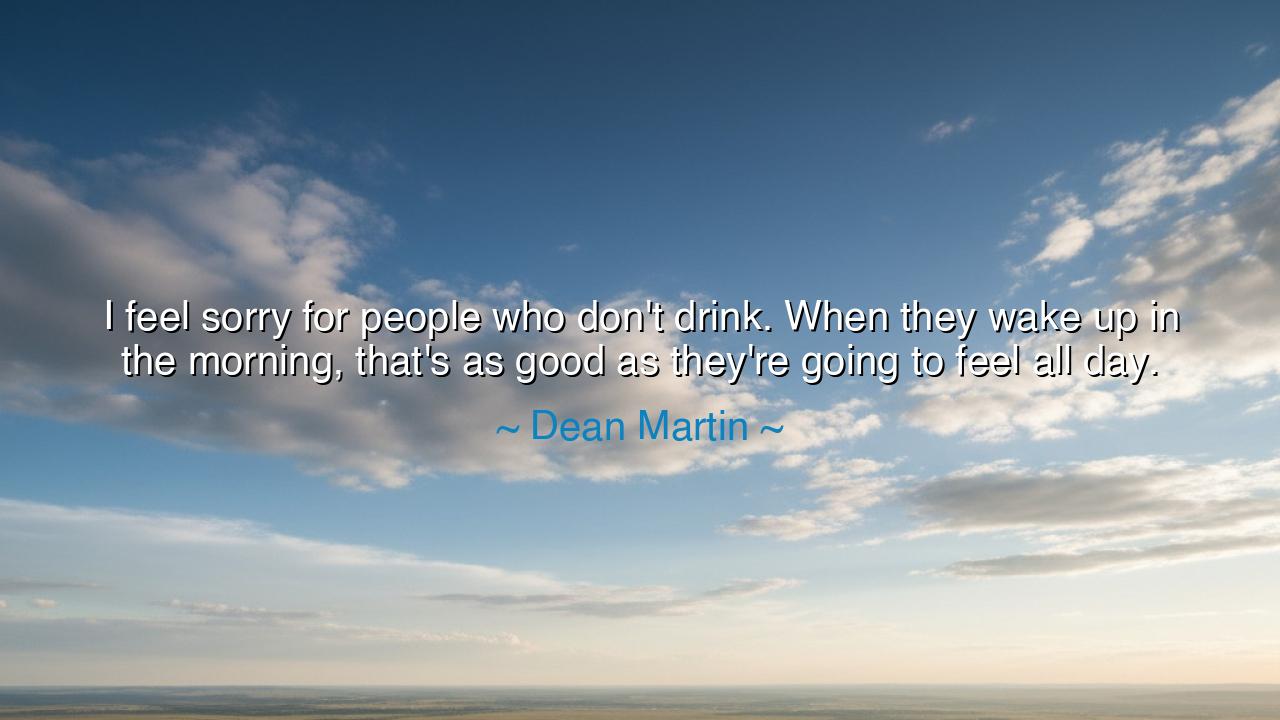
I feel sorry for people who don't drink. When they wake up in
I feel sorry for people who don't drink. When they wake up in the morning, that's as good as they're going to feel all day.






The singer and entertainer Dean Martin, with his characteristic humor and charm, once said: “I feel sorry for people who don't drink. When they wake up in the morning, that's as good as they're going to feel all day.” At first, these words may sound like nothing more than a jest, the playful quip of a man who loved laughter and conviviality. Yet beneath the humor lies a deeper reflection on the search for joy, the fleeting nature of pleasure, and the ways in which people seek to elevate the ordinary rhythm of life.
This quote can be seen as a commentary on the human desire to rise above the mundane. Martin implies that for those who abstain from drinking, the best moment of the day is the morning’s freshness, while those who do indulge find the possibility of joy and release throughout the day. It is not simply an endorsement of drink, but rather an expression of how people yearn for some spark—whether through celebration, companionship, or ritual—that makes life more vivid than its plainest form. In his way, Martin reminds us that life without moments of exaltation risks becoming dry and monotonous.
History has known many who sought such sparks, though not always in drink. Epicurus, the ancient philosopher, spoke of pleasure as the natural aim of life—not indulgence, but the gentle pursuit of happiness that lifts man above mere survival. In the taverns of Rome, citizens found camaraderie and release from the burdens of empire. In the salons of Paris, wine flowed with conversation that gave birth to revolutions of thought. Martin’s quip, lighthearted though it was, echoes this ancient truth: men and women seek more than routine—they seek celebration.
And yet, there is a double edge to the saying. For pleasure, if unmeasured, can turn from blessing to burden. The same drink that warms the heart in fellowship may enslave the spirit in excess. History also tells of kings and poets undone by indulgence, of warriors who lost their strength to the very cup that once gave them courage. Martin’s humor, then, may also conceal a subtle truth: that those who “don’t drink” are spared certain sorrows, but perhaps also miss the peculiar joys of shared wine and laughter.
The meaning of this quote, then, rests not solely in the glass, but in what the glass symbolizes. It stands for joy, for release, for the simple act of making life lighter than it is. Martin, as a performer, understood better than most that human beings crave moments of elevation, moments where the weight of the world is forgotten, if only for an hour. His jest is less about alcohol itself and more about the spirit of liveliness that transforms existence into something worth remembering.
The lesson for us is this: seek joy beyond the morning freshness. Whether through music, friendship, laughter, faith, or even a well-earned drink, find the rituals that carry you beyond the ordinary. But temper them with wisdom. Do not let pleasure master you, but let it serve as a companion to lighten your path. Practical action may be simple: share a meal with loved ones, laugh deeply, celebrate milestones, and allow life to have flavor. These are the “drinks” that sustain the soul far longer than the cup alone.
Thus, Dean Martin’s quote endures not only as humor but as philosophy. It reminds us that life should not be lived in gray monotony, that joy must be pursued and celebrated, and that sometimes the spirit needs something more than the mere rising of the sun to feel alive. Let us then live not as those who only feel good upon waking, but as those who find throughout the day opportunities for cheer, for celebration, and for the kind of happiness that lingers long after the cup is empty.






AAdministratorAdministrator
Welcome, honored guests. Please leave a comment, we will respond soon